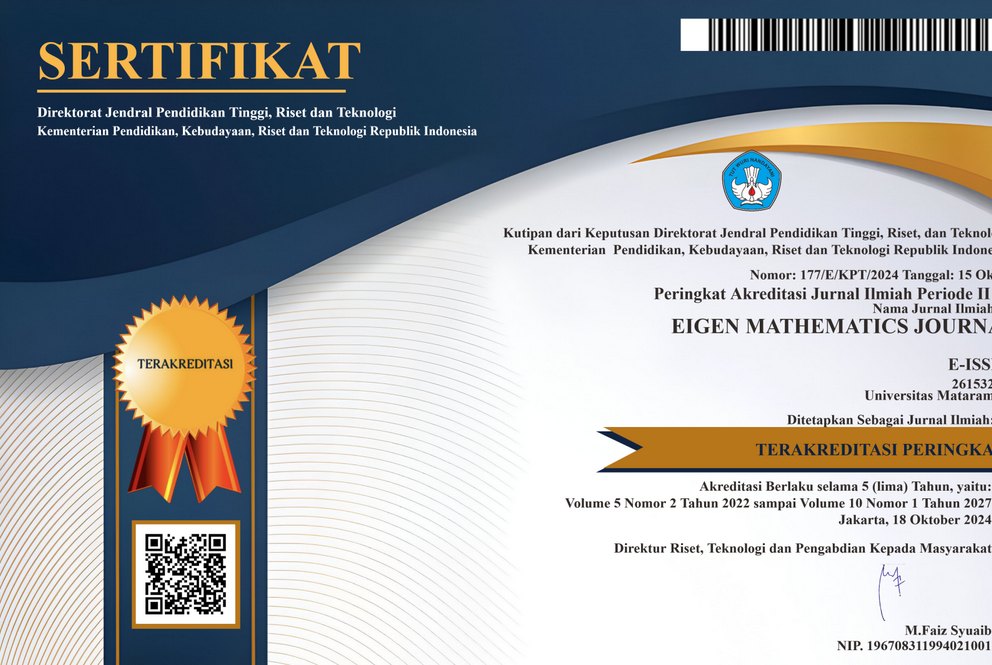Penerapan Metode Hungarian dalam Penugasan Dosen Pengampu Mata Kuliah Program Studi Matematika FMIPA Universitas Mataram
DOI:
https://doi.org/10.29303/emj.v3i2.63Keywords:
Lecturer, Assignment Problem, Course, Hungarian Method, preferencesAbstract
The tight schedule of lecture activities requires accuracy so that it always runs smoothly. Lecturer assignments play an important role to ensure the smooth lecture activities. Problems that often occur in the assignment of these lecturers need to be avoided. In an effort to reduce the risk of problems that occur in the assignment of lecturers, it is necessary to make a structured system with the right method. Hungarian method can be said very appropriate for this assignment problem because each course will only be charged to one lecturer. Another advantage of using the hungarian method in this lecturer assignment model is also because it uses the preferences of prospective lecturers as subjects of measurement. Each lecturer will take courses according to their best preferences with the expectation that the lecturer will have more mastery in the courses that he will teach.References
Anton, H dan Rorres, C.W. Aljabar Linear Elementer Versi Aplikasi. Edisi ke-8 [Indriasari, R. Alih bahasa].Safitri, A.(ed), Jakarta: Erlangga ; 2004.
Bustanul Arifin noer, (2010), Riset Operasional,Yogyakarta.
Hillier, S.F. dan Lieberman. Introduction To Operations Research, Eighth Edition, New York: Mc Graw-Hill ; 2004.
Jackson, M. C. (1982). The nature of soft systems thinking: The work of Churchman, Ackoff and Checkland. Journal of applied systems analysis, 9(1), 17-29.
Morse, P. M., Kimball, G. E., & Gass, S. I. (2003). Methods of operations research. Courier Corporation.
Ndruru, E., Waruwu, F. T., & Yanny, A. (2017). Alokasi Pekerja Pada Suatu Proyek Dengan Metode Hungarian (Studi Kasus: Pt. Ira Widya Utama Medan). KOMIK (Konferensi Nasional Teknologi Informasi dan Komputer), 1(1).
Pratama, A.N. & Yudoko, G, “Proposal for Supplier Relationship Management at PT XL Axiata Tbk.”, The Indonesian Journal of Business administration, Vol. 2, No. 17, 2013.
Putra Dian Perdhana.2013. Penerapan Hungarian Method Untuk Menyelesaikan Personnel Assignmenet problem. Bandung: Artikel Teknik Informatika.
Taha, H. A., 2007. Operations Research: An Introduction 8th Edition. Pearson Prentice Hall. Pearson Education, Inc.
Taha, Hamdy A., (1993). Operations Research: An Introduction. Edisi ketiga. Macmillan Publishing Co, New York.
Published
How to Cite
Issue
Section
License
All articles published in the Eigen Mathematics Journal will be available for free reading and downloading. The license applied to this journal is Creative Commons Attribution-Non-Commercial-Share Alike (CC BY-NC-SA).
Most read articles by the same author(s)
- Raehanatul Mardiyah, Mamika Ujianita Romdhini, Irwansyah -, Penggunaan Algoritma Genetika Untuk Penjadwalan Penerbangan di Bandara Internasional Lombok , EIGEN MATHEMATICS JOURNAL: Vol. 1 No. 2 Desember 2018
- Devi Lastri, Masriani Masriani, Nadia W, Parizal Hidayatullah, Wahyu Ulfayandhie Misuki, Mamika Ujianita Romdhini, Aplikasi Algoritma Kruskal dalam Pembuatan Saluran Air PDAM di Wilayah KLU , EIGEN MATHEMATICS JOURNAL: Vol. 2 No. 1 Juni 2019
- Halilintar Nur Hidayatullah, Mamika Ujianita Romdhini, Irwansyah Irwansyah, Implementasi Algoritma IDA* (Iterative Deepening A*) Dalam Menentukan Solusi Terbaik Pada Permainan Othello Dengan Simulasi MATLAB , EIGEN MATHEMATICS JOURNAL: Vol. 1 No. 1: Juni 2018
- Hibban Kholiq, Mamika Ujianita Romdhini, Marliadi Susanto, Algoritma Needleman-Wunsch dalam Menentukan Tingkat Kemiripan Urutan DNA Rusa Timor (Cervus timorensis) dan Rusa Merah (Cervus elaphus) , EIGEN MATHEMATICS JOURNAL: VOL. 3 NO. 2 DESEMBER 2020
- Puguh Riawang, Mamika Ujianita Romdhini, Irwansyah -, Perbandingan Algoritma A* (A star) dan Algoritma IDA* (Iterative Deepening A* Pada Permainan Sliding Puzzle , EIGEN MATHEMATICS JOURNAL: Vol. 2 No. 2 Desember 2019
- Abdul Azis Lalu Mursy, Hibban Kholiq, Diah Ayu Saptyaningtyas, Rina Juliana, Mira Sulisdiana, Mamika Ujianita Romdhini, Menentukan Rute Terpendek Pendistribusian Bahan Bangunan oleh PT. Sadar Jaya Manunggal Mataram Menggunakan Algoritma Branch and Bound , EIGEN MATHEMATICS JOURNAL: Vol. 2 No. 1 Juni 2019
- Kurniawan Sugiarto, Mamika Ujianita Romdhini, Ni Wayan Switrayni, Analisis Automorfisma Graf Pembagi-nol dari Ring Komutatif dengan Elemen Satuan , EIGEN MATHEMATICS JOURNAL: Vol. 1 No. 1: Juni 2018
- Husni Fitroti, Mamika Ujianita Romdhini, Ni Wayan Switrayni, Hill Cipher Algorithm with Generalized Fibonacci Matrix in Message Encoding , EIGEN MATHEMATICS JOURNAL: Vol. 4 No. 2 Desember 2021
- Muhammad Taufan, Mamika Ujianita Romdhini, Ni Wayan Switrayni, Analisis Keberhinggaan Matriks Representasi atas Grup Berhingga , EIGEN MATHEMATICS JOURNAL: Vol. 1 No. 1: Juni 2018






